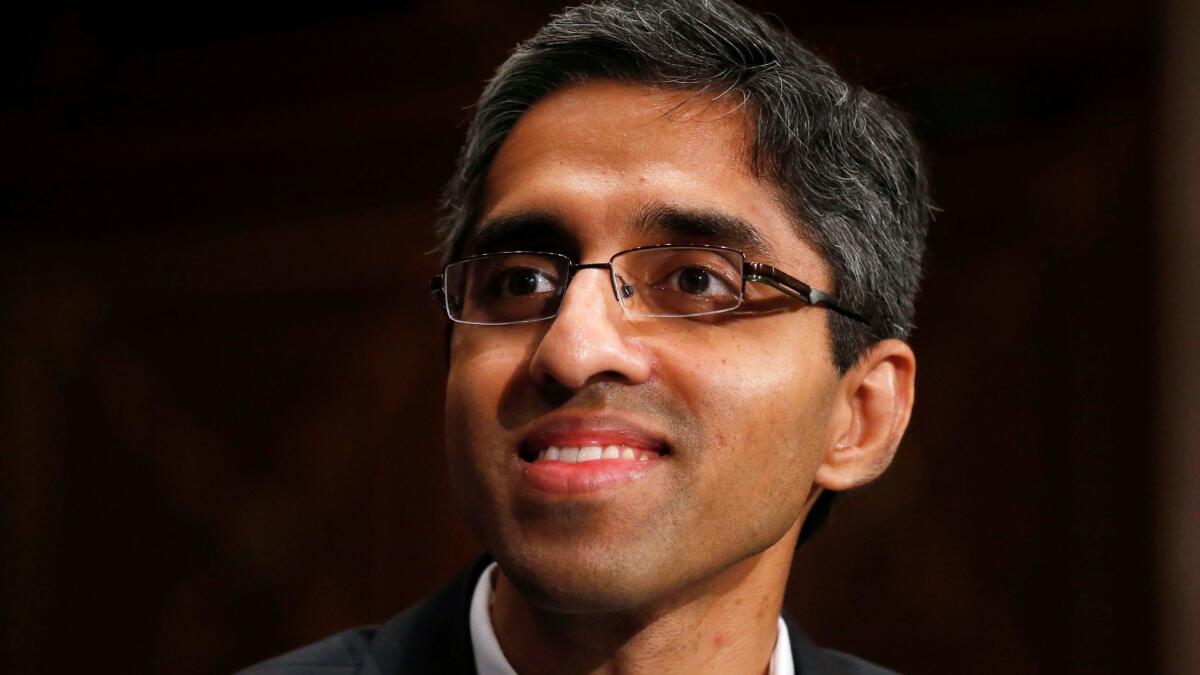U.S. surgeon general issues ‘a new call to action’ on addiction

When Dr. Vivek Murthy left his Massachusetts hospital to become U.S. surgeon general, the nurses who had known him since he was a resident had a parting plea: Do something about addiction.
On Thursday, Murthy tried to make good on that request with the release of a first-of-its-kind report calling for “a cultural shift in how we think about addiction.”
“For far too long, too many in our country have viewed addiction as a moral failing,” Murthy said in the report. “It is a chronic illness that we must approach with the same skill and compassion with which we approach heart disease, diabetes and cancer.”
The report comes at a time of great concern about addiction and uncertainty about how the Trump administration will respond to it. Drug overdoses have surpassed car accidents as a cause of death in recent years, a surge driven by the opioid epidemic. Prescription painkillers have killed more than 200,000 people since 1999 and their abuse has led to a resurgence in heroin addiction.
The 426-page report, titled “Facing Addiction in America,” was modeled on the 1964 surgeon general’s report on smoking and health, which first linked cigarettes to cancer and led to a successful national campaign against tobacco use.
Murthy described the report as “a new call to action.” It lays out recommendations for elected officials, the medical community, law enforcement and the public to improve the way addiction is treated.
More than 20 million Americans suffer from substance abuse disorders, far more than are diagnosed with cancer, but only about 10% receive treatment, according to the report. Murthy said that stigma surrounding addiction dissuades people from getting help and the report repeatedly referred to addiction as “a chronic brain disease.”
At a forum to highlight the report at the Studios at Paramount in Los Angeles, Murthy said that stigma surrounding addiction dissuades people from getting help. Some of the top government scientists studying addiction showed an audience of advocates, recovering addicts and family members brain scans that they said made clear addicts were suffering from a legitimate illness rather than moral weakness.
“Science tells us clearly that addiction is a disease of the brain,” Murthy said.
Many advocates had pinned their hopes on Hillary Clinton, who had pledged to spend $10 billion on a wide-ranging initiative to combat addiction. President-elect Trump’s position is less defined, and a rollback of the Affordable Care Act could mean less insurance coverage for measures Murthy described in his report, such as the use of medications to treat addiction.
“There’s no question we missed our best chance to revolutionize this space when Hillary Clinton lost,” said former Rep. Patrick J. Kennedy (D-R.I.), a recovering addict who has long advocated for better mental health care.
He said he was trying to give Trump the benefit of the doubt on addiction issues, noting that the president-elect lost his brother to alcoholism and that many voters who supported him come from states devastated by abuse.
“The hardest-hit sections of the country in the opiate crisis are red states,” Kennedy said.
In the run-up to the presidential primaries in New Hampshire and Iowa, areas reeling from opioid abuse, addiction was a central campaign issue with candidates sharing stories about family members and friends who were affected. The deeply divided Congress passed rare bipartisan legislation to address the opioid epidemic last year, but Republicans ultimately balked at President Obama’s request for a billion dollars of funding to implement the measures and the issue faded in the general election.
“We were really disappointed that the issue didn’t come up in any of the debates,” said Greg Williams, the co-founder of the nonprofit Facing Addiction, which is working with the surgeon general’s office.
He said Murthy’s report offers a road map for solving the problem and “the challenge is we have to find the public will to implement what we know can work.”
Twitter: @latimesharriet
ALSO
Anaheim daycare center worker accused of molesting two girls, ages 6 and 7
L.A. leaders just vowed to fight deportations under Trump. Here’s what they’ve proposed
Santa Ana winds bring fire risk, frost advisories to Los Angeles and Ventura counties
UPDATES:
2:35 p.m.: This article was updated to include quote from Murthy. Also, a previous version said the surgeon general’s term was nearing an end. He was appointed to a 4-year term in Dec. 2014.
More to Read
Sign up for Essential California
The most important California stories and recommendations in your inbox every morning.
You may occasionally receive promotional content from the Los Angeles Times.











